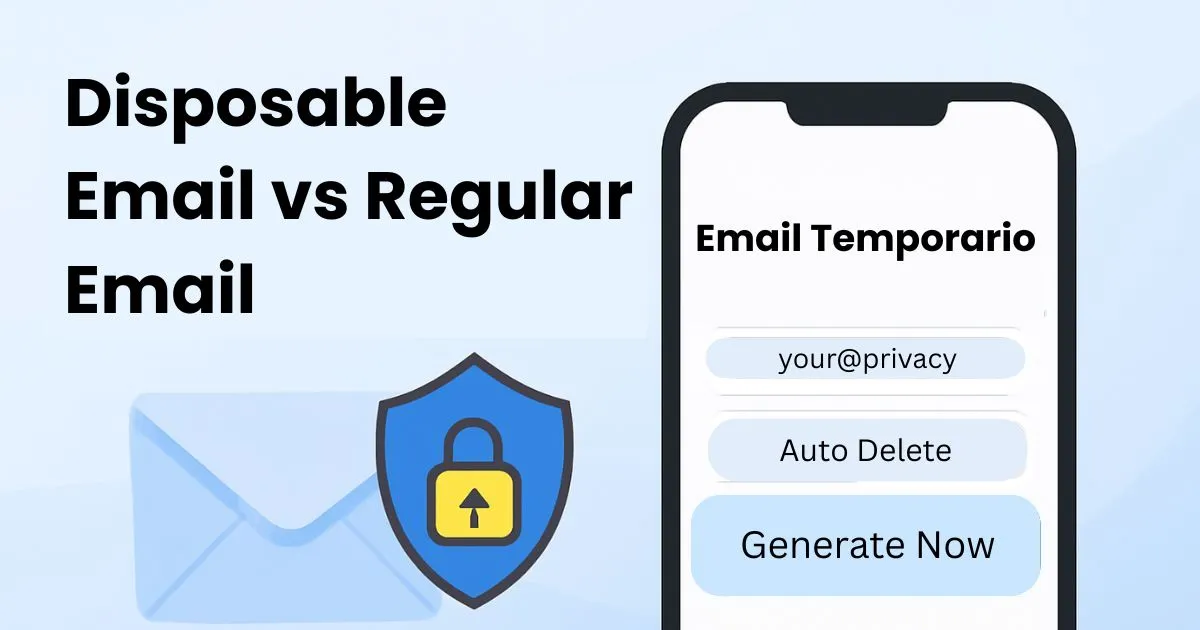Disposable and Regular Email Addresses
Email addresses are an essential part of communication, be it for personal or professional purposes. However, not all email addresses are created equal. Two of the most commonly used types of email addresses are disposable email addresses and regular email addresses. Each type has its specific use cases, advantages, and limitations. In this blog post, we’ll delve into the key differences between disposable and regular email addresses, helping you understand when and why to use each.

What is a Regular Email Address?
A regular email address refers to an email address that you use for long-term communication, usually linked to your primary or personal email account. This type of address is often tied to your identity, associated with your main service providers like Gmail, Yahoo, or Outlook.
Key Features of Regular Email Addresses:
-
Permanent: Regular email addresses are designed for long-term use and are generally not discarded unless you choose to delete them.
-
Identity-Linked: They are typically tied to your personal or professional identity and often used for important communications, including banking, work correspondence, and social media accounts.
-
Secure: Regular email addresses often come with built-in security features like two-factor authentication (2FA) and encryption, which help protect sensitive data.
-
Support Services: Your primary email provider offers customer support in case of issues like password recovery or account problems.
Examples:
What is a Disposable Email Address?
A disposable email address is a temporary, anonymous email address often used for short-term needs, such as signing up for websites, downloading eBooks, or subscribing to newsletters without revealing your personal email. These addresses are typically valid only for a short period before they expire and are discarded.
Key Features of Disposable Email Addresses:
-
Temporary: Disposable email addresses are often designed to last anywhere from a few minutes to a few days, and are intended to be used for a specific task before they expire.
-
Anonymous: They offer a level of privacy by allowing you to engage online without revealing your primary, personal email.
-
No Ongoing Support: Since disposable email addresses are temporary, they usually do not offer customer support or recovery options. (EmailTemporario offer you support)
-
Spam Protection: Disposable email addresses are frequently used to prevent spam and junk mail from filling up your main inbox.
Examples:
Key Differences Between Disposable and Regular Email Addresses
While both disposable and regular email addresses serve the basic function of receiving and sending emails, their use cases, features, and longevity set them apart. Let’s compare these two types of email addresses across different aspects:
1. Longevity
-
Regular Email Address: Permanent, can be used for years and is rarely discarded unless you actively delete it.
-
Disposable Email Address: Temporary and automatically expires after a short duration, which can range from minutes to days.
2. Privacy and Anonymity
-
Regular Email Address: Provides a permanent link to your identity and is typically tied to your personal or professional life. It’s not designed for anonymous use.
-
Disposable Email Address: Designed for anonymity and privacy, disposable emails shield your identity, protecting your main inbox from unsolicited communications.
3. Security
-
Regular Email Address: Generally has advanced security measures, including password protection, two-factor authentication, and encryption protocols.
-
Disposable Email Address: Security features are minimal, as these services are meant for quick, temporary use and often do not offer robust protections.
4. Spam Protection
-
Regular Email Address: While you can filter spam with regular email addresses, your primary inbox is still susceptible to unsolicited emails over time.
-
Disposable Email Address: Provides a built-in layer of spam protection by keeping your primary email address free from junk or unwanted mail, as it can be discarded after use.
5. Professional Use
-
Regular Email Address: Ideal for professional use, as it is reliable and secure. Businesses and professionals use it for critical communication.
-
Disposable Email Address: Not suitable for professional or formal use due to its temporary nature and lack of reliability.
6. Usage and Flexibility
-
Regular Email Address: Used across all facets of life, from professional communications to personal correspondence, and for signing up to services that require long-term interaction.
-
Disposable Email Address: Typically used for one-time tasks, like registering for a website or receiving confirmation emails without exposing your personal email.
When Should You Use a Disposable Email Address?
There are several scenarios where using a disposable email address is not only convenient but advisable. Here are some common use cases:
1. Website Sign-ups
If you’re registering for a website but don’t want to be bombarded with spam or promotional emails later, using a disposable email address can protect your primary inbox.
2. Testing or Trial Services
Many online services offer free trials, and disposable email addresses allow you to sign up without risking your personal email being flooded with promotional emails when the trial ends.
3. Avoiding Spam
When entering your email on unfamiliar websites or forums, a disposable email ensures that your main inbox remains clean and free from unwanted emails.
4. Privacy Concerns
If you are wary of giving out your real email address, such as when signing up for an online contest or accessing a free resource, using a disposable email is a smart way to protect your privacy.
When Should You Use a Regular Email Address?
On the other hand, there are instances where you should rely on your regular email address. Here’s when it makes the most sense:
1. Professional Communications
When dealing with clients, colleagues, or business partners, using your regular email ensures credibility and security. It’s essential for clear communication and building trust.
2. Personal Correspondence
For staying in touch with friends and family, using a regular email address is more personal and reliable than a disposable one.
3. Secure Transactions
For tasks involving secure transactions, such as banking, shopping, or sending sensitive information, a regular email address is critical as it provides better protection against hacks and phishing attempts.
4. Account Recovery
Many online services require access to your email for account recovery. Using a regular email address ensures that you can recover access to your accounts if you forget your password or if your account is compromised.
Pros and Cons of Disposable vs. Regular Email Addresses
To summarize, here are the pros and cons of both disposable and regular email addresses:
| Feature | Disposable Email Address | Regular Email Address |
|---|---|---|
| Longevity | Temporary, expires quickly | Permanent |
| Privacy | High, anonymous | Low, identity-linked |
| Security | Minimal, no 2FA | High, supports 2FA |
| Spam Control | Effective, no spam in primary inbox | Requires spam filters |
| Professional Use | Not suitable | Ideal for professional use |
| Support | No support | Support from email provider |
How to Create and Use a Disposable Email Address Safely
If you decide to use a disposable email address, here’s a step-by-step guide on how to do so safely:
-
Choose a Reliable Provider: Use trusted disposable email services like Emailtemporario.net, which offer a secure way to generate temporary email addresses.
-
Avoid Using for Sensitive Transactions: Don’t use disposable emails for financial transactions or anything that requires long-term communication.
-
Set Expiration Limits: If your provider allows, choose an expiration time that suits your needs, ranging from a few minutes to days.
-
Delete After Use: Make sure to delete the disposable address after completing the task to ensure no residual data remains.
Conclusion: Disposable or Regular Email?
Both disposable and regular email addresses have their place in the digital landscape. Regular email addresses are the backbone of everyday communication and essential for anything requiring long-term interaction or security. Disposable email addresses, on the other hand, are perfect for short-term tasks, enhancing privacy, and protecting your primary inbox from spam.
By understanding the differences and knowing when to use each, you can better protect your personal information and streamline your online activities. Whether you're using a disposable email for a one-off sign-up or your regular email for professional matters, both types play a vital role in keeping your digital life organized and secure.
